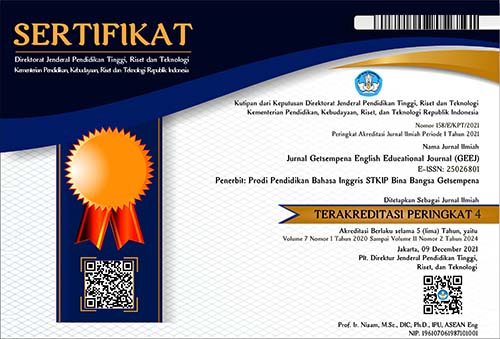EXPLORING TEACHING AND LEARNING ENGLISH AT SMAIT NURUL FIKRI
Abstract
Nowadays, the total number of parents who send their children to the school of Islam Terpadu (IT) increased significantly especially in Aceh. The design of mixed curriculum between general education and religious education became a trigger for parents. The aim of this study is to explore teaching and learning English at one of senior high schools of Islam Terpadu (IT) in Banda Aceh in terms of teaching strategies, media and assessment. This study used qualitative method in nature. Two English teachers who taught at the tenth grade were participated in this study. Observations and interview were conduct to collect the data. The data were analysed and interpreted through qualitative procedures. The findings indicated that teachers used various strategies, media and different assessment in teaching English to motivate the students to learn English. In other hand, talent program stimulated the students to improve their English abilities which are related to religious education. However, the teachers expect to set out the English contents more specifically toward religious education (Qur’an and Hadits).
References
Adnan, M., & Anwar, K. (2020). Online learning amid the COVID-19 pandemic: Students' perspectives. Journal of Pedagogical Sociology and Psychology, 2(1), 45-51. https://doi.org/10.33902/JPSP. 2020261309.
BPK (2013). Peraturan pemerintah standar nasional Pendidikan. https://peraturan.bpk.go.id/Home/Details/5364/pp-no-32-tahun-2013 Peraturan pemerintah standar nasional Pendidikan .
Elihami (2016). The Challenge of Religious Education in Indonesia Multiculturalism. Journal of Education and Human Development. 5. 10.15640/jehd.v5n4a20.
Flores, Maria & Gago, Marilia. (2020). Teacher education in times of COVID-19 pandemic in Portugal: national, institutional and pedagogical responses. Journal of Education for Teaching. 1-10. 10.1080/02607476.2020.1799709.
Hartshorn, K., & McMurry, B. (2020). The Effects of the COVID-19 Pandemic on ESL Learners and TESOL Practitioners in the United States. International Journal of TESOL Studies, 2(2), 140-156. doi:https://doi.org/10.46451/ijts.2020.09.11
Hashim, Che Noraini & Langgulung, Hasan. (2008). Islamic Religious Curriculum in Muslim Countries: The Experiences of Indonesia and Malaysia. Bulletin of Education & Research. 30 (2), 201-210.
Hidayati, Tuti. (2017). English Language Teaching in Islamic Education in Indonesia; Challenges and Opportunities. Englisia Journal. 3(2). 65-82
Jakarta post. 2020. Regions close schools, cancel public events because of COVID-19" https://www.thejakartapost.com/news/2020/03/15/regions-close-schools-cancel-public-events-because-of-covid-19.html. Retrieved November 2020.
Maneschijn, M & Botha, Adele & Biljon, Judy. (2013). A critical review of ICT skills for higher education learners. IEEE International Conference on Adaptive Science and Technology, ICAST. 1-13. 10.1109/ICASTech.2013.6707503.
Nashruddin, Wakhid. (2015). Teaching English as A Foreign Language at Madrasah Ibtidaiyyah: Facts and Challenges. DINAMIKA ILMU. 15. 67. 10.21093/di.v15i1.94.
OECD (2020), Reading performance (PISA) (indicator). doi: 10.1787/79913c69-en (Accessed on 07 December 2020)
Okmawati, Mike. (2020). The Use of Google Classroom during Pandemic. Journal of English Language Teaching Volume 9(2). 23-32. http://ejournal.unp.ac.id/index.php/jelt
Prihantoro, Rudy. (2015). The perspective of curriculum in Indonesia on environmental education. International Journal of Research Studies in Education. 4. 10.5861/ijrse.2014.915.
Ünal, Yurdagül & Alır, Gülten & Soydal, Irem. (2014). Students Readiness for E-Learning: An Assessment on Hacettepe University Department of Information Management. Communications in Computer and Information Science. 423. 137-147. 10.1007/978-3- 662-44412-2_13.

























